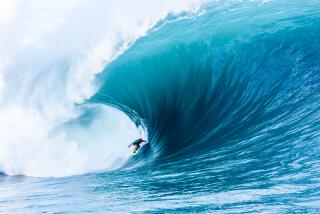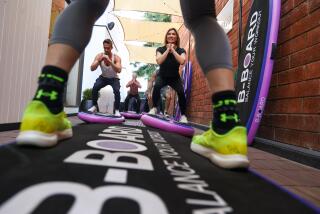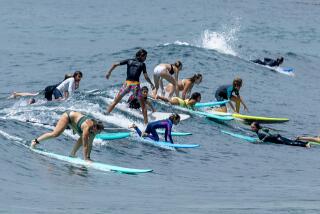Work Is Play for the Founder of Patagonia
- Share via
LA CONCHITA — It’s one of those perfect, sunny afternoons, a time when most working stiffs are tethered to their desks, and Patagonia’s founder, Yvon Chouinard, is pushing the limits of a wave peeling across an empty beach.
The wave isn’t that big, shoulder high perhaps. Still, it’s powerful enough to snap Chouinard’s surfboard and slam him into the sand. Chouinard comes up sputtering, but unfazed. The board’s nose dangles limp and useless, like a broken limb.
“Damn, this is the second board I’ve broken in three weeks,” Chouinard tells Shaun Tomson, a former world champion surfer and a new employee at Patagonia’s headquarters in Ventura.
To Chouinard, this afternoon frolic in the surf with one of his top staffers is as much about industrial research as it is a diversion from the office. In his world, the lines between work and play are blurred.
Chouinard is the unlikely owner of a company with 700 employees that sold about $150 million in warm and fuzzy outdoor clothing last year. He sees himself as a craftsman, amazed at what has sprung up from his simple desire to make stuff he likes to wear and use while rock and ice climbing, skiing, kayaking and fishing.
Now the inveterate tinkerer wants to make a splash in the surfing industry, partly out of boredom with the mountain gear that made him famous.
Chouinard recently hired Tomson to direct Patagonia’s sports and surf clothing lines. And he has launched a “skunk works” project rethinking the traditional foam and fiberglass construction of surfboards. He wants to build a board that is indestructible.
“The surfboard industry has not kept up with technology,” Chouinard said. “I would like to revolutionize how surfboards are made. We did that with climbing gear. There is no reason we cannot do that with surfboards.”
Chouinard is not talking about an extensive foray into surfboard manufacturing. Nor does he plan to compete with local surf shops. He just wants to stock Patagonia’s stores with boards. If he does, he said he will insist that they have the same quality and durability as Patagonia’s clothes.
They will be more expensive than regular boards, he promises. They will be more practical too, devoid of the fleeting fashion of the potato-chip-thin boards that he believes are intentionally--and irresponsibly--designed to self-destruct.
“I’m interested in the best surfboards in the world,” he said. “If we can produce a surfboard which causes people to pay attention, whether we make money or not, I don’t care.”
At age 56, Yvon Chouinard’s mark in sports remains in the mountains, where he pioneered rock- and ice-climbing techniques and equipment. As a younger man, he gained considerable recognition for being the first to scale certain mountainous walls, such as a particularly difficult route up the face of Yosemite’s El Capitan.
Yet all along, his favorite sport has been surfing. He learned to surf at Malibu while growing up in Burbank and spent his youth chasing waves whenever he wasn’t in the mountains. He moved his mountaineering equipment machine shop to Ventura in 1964 to be close to good surf.
He lives in an oceanfront house on Pitas Point, a rocky break a few miles north of Ventura, and has traveled the world in search of perfect waves. He’s now building a retirement house inside the gates of Santa Barbara County’s Hollister Ranch, one of the best, most exclusive surf spots on the California coast.
Chouinard surfs just about every day and encourages his employees to pursue their passions, dictating a work-hard, play-hard ethic. He wants them to be out skiing, paddling or surfing so they can spot budding trends the firm can incorporate into its gear.
In his manifesto, “Patagonia: The Next Hundred Years,” Chouinard outlines his hiring philosophy.
“We need to seek out and hire ‘dirt bags.’ These are the passionate outdoor people who are our core customers. We believe that it is easier to teach people business than to turn a businessman into a passionate outdoor person. When the surf’s up, you go surfing, you don’t plan to go next Tuesday at 2 o’clock.”
Tomson, who spent 15 years on the pro surfing tour and won the world title in 1977, is not the only world-class athlete Chouinard has in his collection.
Paul Parker runs the company’s alpine clothing line, when he is not off with the U.S. Nordic Demonstration Ski Team. He is the author of “Free-Heel Skiing,” a primer on the Telemark technique.
Jeannie Wall directs Patagonia’s line of mountaineering clothes. A gifted athlete, she grabbed headlines in 1994 by outdoing many of the best cross-country skiers at Olympic trials--as a novice competitor. In the end, she missed the U.S. Ski Team by one place.
Bob McDougall was the closest thing to a professional white-water kayaker before he joined Patagonia to take charge of paddle sports. He works part time; his free time is spent running rivers as the star of National Geographic television specials or working on other video projects.
Chouinard has an ulterior motive for gathering these top performers. Although he does not want to sell Patagonia, he doesn’t want to run it either.
“All I really want to do is go off fishing and surfing and climbing,” Chouinard said.
He now spends about six months each year gallivanting around the globe in search of surf, fish, rocks and rivers. He is gone so much of the time, his employees joke about his “MBA” method--management by absence.
Chouinard says he has given up on finding one person who can do it all: manager, entrepreneur, visionary. So he has focused on assembling a team of top managers and sports enthusiasts who can keep Patagonia on the cutting edge of the industry.
“Anytime I can get someone else to take my place, that’s great,” Chouinard said. “By bringing in a world-class surfer, it takes a lot of heat off of me. If I can duplicate myself around the company many times, then I’m outta here.”
When he is at work, Chouinard pads around the office in shorts, a sport shirt and tennis shoes or thongs. He often seems eager to leave, and his employees describe him as distant, even shy one-on-one.
The easiest, most natural connections with his employees seem to come while engaged in sport. Chouinard often invites staff members skiing, surfing or fishing to talk things over.
On a regular business day in Ventura, Chouinard and Tomson began prowling the coast for waves shortly before dawn. No luck that morning, but the two were back at it in the afternoon.
Slipping out of the office shortly after 4, they discovered that the winds had kicked up some surf worth riding in the Santa Barbara Channel. They wriggled into wet suits and swapped turns catching waves on the nearly deserted beach.
Tomson carved up each wave with the graceful, balletic moves that won him numerous awards on the world tour. Chouinard, crouching low, pushed his long-board . . . well, to the breaking point.
The boss gamely tried to surf on the broken board. But the board’s decking started to peel away under the force of the water. Finally, he was forced to quit for the afternoon.
Such equipment failures have little place in the world according to Chouinard, whether it be pitons, ice axes, clothing or surfboards.
In his early years as a mountain climber, he replaced soft iron pitons with unbending steel. He revolutionized ice-climbing gear by trial and error and his own experience.
Later, he helped develop breathable clothing that draws moisture away from the skin so that he could sweat or get wet and remain relatively dry and warm.
“I basically make stuff for myself,” Chouinard said. “Now I need a surfboard that doesn’t break.”






